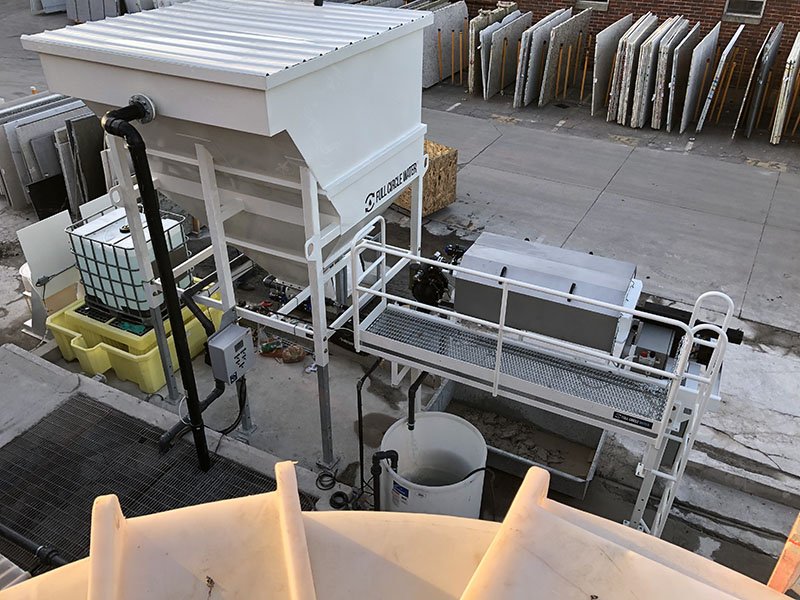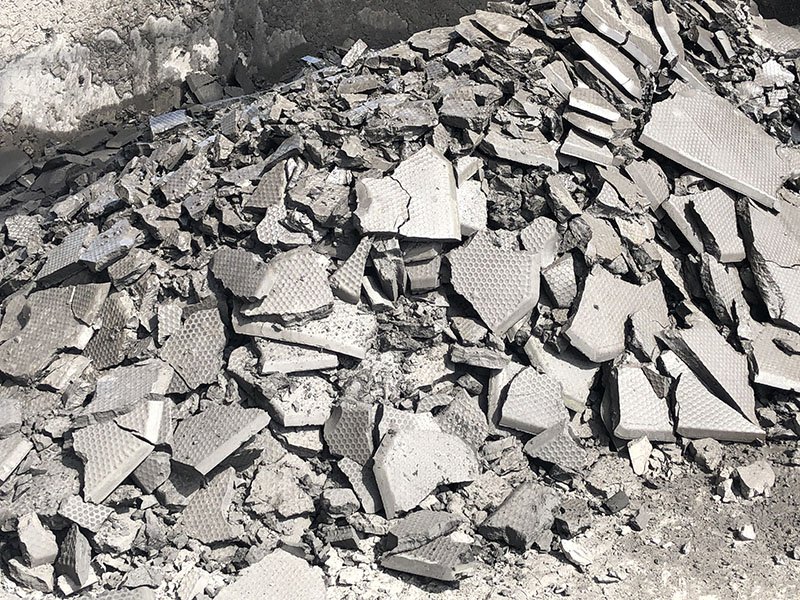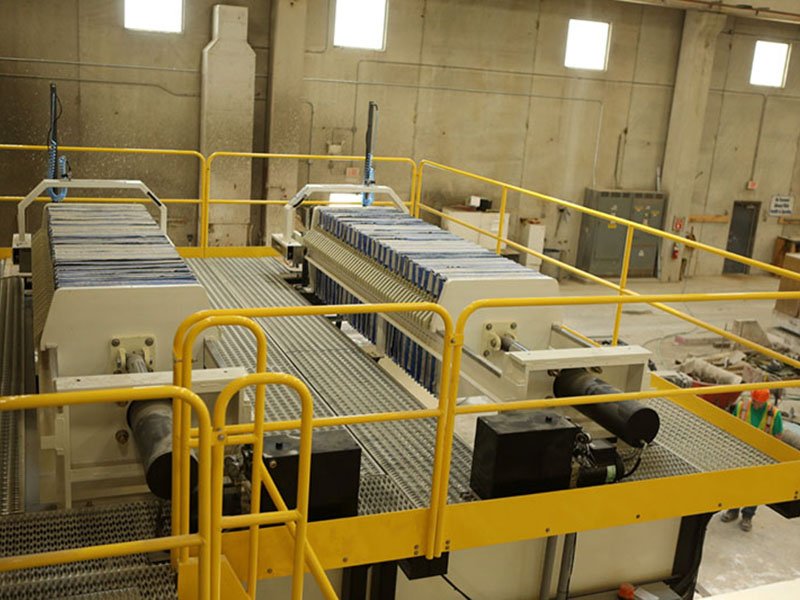Filter Press Systems engineered to incorporate the latest in technology for simplicity and reliability!
Full Circle Water wastewater equipment packages are designed with robust pumps, piping, valving, and controls to handle the harsh pH and alkalinity associated with concrete slurry. The equipment can be incorporated into an existing operation’s slurry pit and the clarified water can be used for batching in many applications for complete reuse of the water. The water can also be used for all wash down applications and for trench and pit rinsing to minimize buildup.
MudHen
Semi Automatic Press
Automatic Filter Press
Trailer Press

Needing Help With Your Slurry
Our team will work diligently to make sure all your slurry problems are solved.
You Inspired Us!
Removes 99.9% of solids
- produce very clean water
- user interface options available
Effectively dewaters slurry
- Options include air blow and membrane squeeze
- Fully automated packages available
Designed to minimize maintenance
- decades of user experience incorporated into product design
- customized options
Manual, semi-automatic, and automated systems are available to clarify your slurry water and to dewater the sludge so it is convenient to haul and dispose. The systems can be installed permanently in a plant or skid and trailer mounted where portability is important.
Remote connectivity is offered as an option on all of our systems. This technology allows us to monitor your equipment remotely and sends your staff reports and status messages via text or email. The user-friendly system gives you more control over your equipment and your slurry.
Filter presses, also known as plate and frame presses, are used in a variety of industries—including concrete and stone fabrication—to treat wastewater and slurry water. They typically operate with a pneumatic diaphragm pump pumping slurry from a pit into the press. The press has numerous plates—each of which has a plastic outer frame and a filter cloth interior—that are held together under about 5,000 lbs. of pressure. Slurry water is pumped through the press and the filter cloth collects a large majority of the sludge in the water. As the press fills with sludge, the pumping rate slows down and eventually the backpressure on the press stops the pump from pumping. At this point or on a prescheduled basis, the shop opens the hydraulic ram and cleans the plates off. Depending on the size of the press and the sludge volume, this can take between 45 minutes and a few hours. Presses come in a variety of sizes and are rated in cubic feet of mud capacity.
Presses require filter cloth replacement on a semi-regular basis depending on the material being filtered and the frequency in which the plates are cleaned. Presses are known for producing consistently good quality of water typically in the 1- to 5-micron range. Presses do require a larger amount of clean water storage and frequent cleanings.
Our precast wastewater systems rely on proven technology to deliver consistent performance results. Specific sizes, models, pumps, and controls are available to match your needs.
Revolutionizing Stone Fabrication slurry water solutions!
Solutions for Concrete
Concrete Filter Press Plants
Our concrete slurry water systems can be complete turnkey packages that offer all components including well-designed and serviceable plumbing solutions or individual skid mounted components to best meet your concrete slurry needs. We ask a lot of questions, find out where you are with your water recycling, and focus on the most cost-effective solution geared towards saving you time and money and ensuring long lasting, reliable equipment that is easy to service.
Not only do suspended solids need to be removed from slurry water before discharge, but the water’s pH level needs to be balanced. Concrete processes almost always raise the pH level and regulations require that it be corrected prior to reuse or disposal. In addition to successfully removing the solids from your water, Full Circle Water also offers pH balancing systems to automatically maintain a user defined range for reuse or discharge.
Full Circle Water has a variety of solutions to treat slurry water, remove the solids, and allow for complete reuse of water or for safe and environmentally friendly disposal. We understand that each situation is unique. To find out what the best course of action is for you, please contact us and let us help you.
Revolutionizing Stone Fabrication slurry water solutions!
Solutions for Stone
Stone Filter Press Plants
Stone, granite and glass fabrication shops throughout North America understand the need to recycle their sludge water. Not only does stone water recycling allow water reuse and significantly reduce water use and costs, collecting the sludge aids in meeting federal, state, and local laws, regulations and ordinances. Many of today’s consumers are searching for fabricators that utilize environmentally friendly business practices. Recycling water can be one of your most important marketing benefits.
Stone industry water involves multiple challenges. Individual stones such as granite, slate, limestone, sandstone, and fieldstone each have unique characteristics. Glass is similar to these stones. Full Circle Water understands the challenges and offers industrial wastewater solutions such as filter presses, lamella clarifiers, vacuum drums, and silo systems.
Sludge water produced from stone fabrication presents unique challenges in sludge removal and in recycling of the water. The nature of the slurry varies by stone type, shop equipment mix, and specific operation of equipment. The largest issue is the removal of suspended solids (slurry) from the wastewater.
Offering multiple solutions to your challenging problems makes FCW unique. Most manufacturers offer one technology. Many times, this leads to unsatisfactory results and an unhappy customer.
No matter the stone processed, the resulting stone water sludge contains a very concentrated range of suspended solids. Stone industry water is made up of small particles of stone of various sizes ranging from as small as a fraction of a micron to as large as hundreds of microns. For reference, consider that a cross section of human hair is about 50 microns. Most of the suspended solids in the water are from 1 to 80 microns. By count, they tend to be 1 to 10 microns. By overall mass, the vast majority of the stone water sludge is in the 20- to 50-micron range.
What makes your slurry settle out of suspension is the size and specific gravity of the stone water particles. The higher the specific gravity and density, the faster it settles. The larger the particle, the faster it settles. Some of the stone water particles can be so small that they will actually float in water for days before settling out.
Issues with Recycling
In stone industry water, suspended solids of a certain size must be removed from the recycled water due to equipment specification (saws can use straight slurry water, while other machines need very clean water). Suspended solids also cause premature pump failure, equipment and piping clogs, and issues with trenches and pits. Suspended solids can also tarnish the polish of stone surfaces (most firms find polishing with water over a certain micron rating causes finish issues on the product surface). All equipment life and reliability is affected (pumps, nozzles, hoses and components wear faster in environments with suspended solids).
An emerging issue in stone industry water is long term corrosion of metal components from a combination of pH levels and other substances, such as alkalinity, hardness, dissolved solids, and temperature in the recycled water. This is exacerbated by chlorination, which is particularly harmful to metal surfaces on your equipment. A good solution for your stone water recycling will take corrosion into consideration.Rotary Vacuum Drum
Filters utilize a slowly moving drum surface to filter sludge out of the water. They are known for producing very clean water and dry sludge, but do so at a higher cost and at a slow rate. The drum rotates on a horizontal axis—usually partially submerged in the slurry water to be filtered. A vacuum sucks the slurry through the drum surface where the sludge that is too large to make it through is filtered. The remaining water passes through to a clean water tank or pit. As solids build up on the outside of the drum, they are scraped off by a blade and fall into a cart for easy disposal.
Vacuum drum filters require a chemical treatment process to build a filter layer on the drum surface prior to treating the water. This usually is done daily by an employee. The costs to operate a vacuum drum include the chemical to build the filter layer, the employee’s time, a higher amount of electricity than other methods of sludge removal, and the maintenance on many moving parts. Vacuum drums consistently deliver clean water at about 1 micron.





